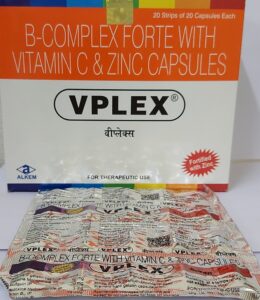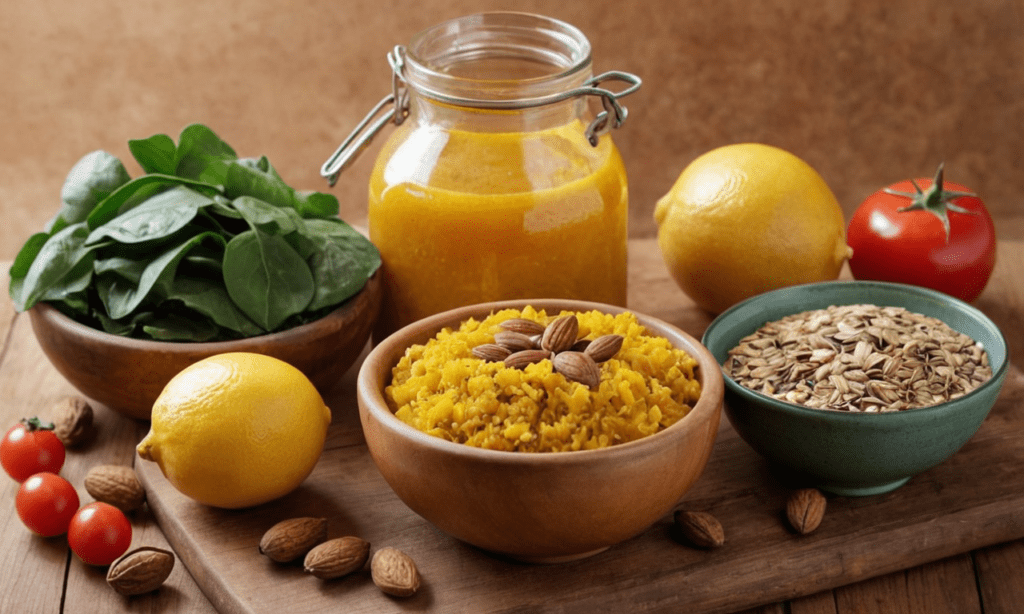Multivitamins in India: Filling Nutritional Gaps in Your Diet
In today’s fast-paced world, maintaining a healthy, balanced diet can be a challenge. This is especially true in India, where regional cuisines, cultural preferences, and even economic factors can influence the types of foods people consume. As a result, many Indians grapple with nutritional gaps, leading to deficiencies in essential vitamins and minerals.
This Informative post explores the role of multivitamins in India. We’ll delve into the common nutritional deficiencies found in Indian diets, the potential benefits of multivitamins, and how to choose the right one for your needs. We’ll also explore the importance of a balanced diet and traditional Indian superfoods that can complement your overall nutritional health.
Understanding Nutritional Gaps in India
A diverse and vibrant country, India boasts a rich culinary landscape. However, this very diversity can contribute to nutritional imbalances. Here’s a closer look at some of the factors contributing to these gaps:
- Regional Cuisines: Dominant food groups vary across regions. For instance, rice is a staple in South India, whereas wheat takes center stage in the North. This can lead to deficiencies in certain nutrients if other food groups aren’t adequately consumed.
- Vegetarianism: A significant portion of the Indian population adheres to a vegetarian or vegan diet. While plant-based diets offer numerous health benefits, they can be lacking in certain vitamins, particularly vitamin B12 and iron.
- Limited Food Access: Economic disparities and uneven food distribution can limit access to a wide variety of fruits, vegetables, and protein sources, crucial for a balanced diet.
- Food Processing Techniques: Over-reliance on processed foods often leads to a decrease in overall nutrient intake. Refined grains, for example, have less fiber and essential vitamins compared to their whole-grain counterparts.
These factors contribute to a high prevalence of deficiencies in essential micronutrients like:
- Iron: Anemia due to iron deficiency is a significant public health concern in India, particularly among women and children.
- Vitamin B12: Essential for nerve function and red blood cell formation, Vitamin B12 deficiency can cause fatigue, weakness, and neurological problems. Plant-based diets lack natural B12 sources, making supplementation crucial for vegetarians and vegans.
- Vitamin D: Limited sun exposure and a lack of dietary sources like fatty fish contribute to Vitamin D deficiency, impacting bone health and immune function.
- Calcium: Another crucial nutrient for bone health, calcium deficiency is a concern, especially as we age.

Do You Need a Multivitamin in India?
While a wholesome, balanced diet should be the primary source of essential nutrients, multivitamins in India can play a supportive role in addressing nutritional shortfalls. Here’s how to determine if a multivitamin might be helpful for you:
Who Benefits Most from Multivitamins?
- Women: Women, particularly those of reproductive age, have greater needs for certain nutrients like iron, B-vitamins, and calcium. Multivitamins formulated specifically for women can offer targeted supplementation. We recommend this high quality multivitamin or this supplement for women as it contains all the essential nutrients required for today’s woman who manage multiple tasks on a daily basis.
- Seniors: As we age, our ability to absorb certain nutrients diminishes. Seniors may benefit from a multivitamin designed to meet their specific needs and counter age-related deficiencies. For Elders, who need the essential calcium to strengthen bones, you can order this.
- Vegetarians and Vegans: Those following plant-based diets have a higher risk of deficiencies in vitamins like B12, iron, and sometimes zinc. Multivitamins can help ensure they meet their daily requirements.
- People with Dietary Restrictions: Individuals with food allergies, intolerances, or those following a restricted diet due to medical conditions may find it challenging to obtain all the necessary nutrients from food alone.
- People with Chronic Illnesses: Certain chronic health conditions like Diabetes, HyperTension, Heart diseases, can lead to malabsorption of nutrients or increased nutritional needs, making supplementation necessary. Check out our informative article on how to manage your Diabetes effectively.
When Food Alone Isn’t Enough
Even with careful dietary planning, meeting your daily nutritional needs can be difficult due to factors like:
- Busy Lifestyles: Hectic schedules can lead to reliance on fast food, processed options, and irregular meals, often lacking in essential nutrients.
- Unhealthy Food Choices: Despite the wide availability of fresh produce in India, many people opt for processed and packaged foods high in sugar, salt, and unhealthy fats. These nutrient-poor choices can create gaps in your nutritional profile.
Signs of Possible Vitamin Deficiencies
Identifying subtle signs of vitamin or mineral deficiencies can help you determine if a multivitamin might be beneficial. Some common symptoms include:
- Persistent Fatigue: Unexplainable fatigue can signal deficiencies in iron, B-vitamins, or vitamin D.
- Hair Loss: Hair loss can be a sign of low iron, zinc, or biotin levels.
- Mood Changes: Irritability and mood swings can be linked to deficiencies in B-vitamins or magnesium.
- Frequent Illness: A weakened immune system due to nutrient deficiencies can make you more susceptible to infections.
If you experience any of these symptoms, it’s advisable to consult with your doctor to determine the underlying cause and explore a personalized supplement plan alongside any needed dietary improvements.
We’ll delve into the benefits of multivitamins in the next section.
The Benefits of Multivitamins
Carefully selected multivitamins can offer a range of potential health benefits in the context of the Indian diet. Here’s a deeper look at how they can support overall well-being:
- Energy Boost: B-vitamins are essential for converting food into energy. Taking a multivitamin can help ensure your body has the necessary fuel to power through your day, especially important in India’s often demanding work and family environments. One of our best selling Vitamin B12 supplements is VPLEX capsules.

- Improved Immune Function: Vitamins C, D, and zinc play crucial roles in supporting a robust immune system. When dietary sources are limited, a multivitamin can help fill the gaps and optimize your body’s defenses, crucial in combating the common cold, flu, and other infections.
- Heart Health: Certain vitamins and minerals, like magnesium, potassium, and antioxidants (vitamin E, vitamin C), contribute to cardiovascular health by regulating blood pressure, cholesterol levels, and inflammation. Multivitamins offer a way to obtain these nutrients when fresh fruits and vegetables aren’t readily available or consumed consistently.
- Stronger Bones: Calcium and vitamin D are vital for building and maintaining strong bones. Ensuring adequate intake of these nutrients, particularly for women and seniors, is essential to reduce the risk of osteoporosis. Indian women, especially those who dress more modestly, may have limited sun exposure, making vitamin D supplementation a consideration. Our store, mygenericmeds provide a wide variety of Calcium supplements in the form of syrup like Calcijoint and in tablets form as Calciquick MCB.
- Specific Needs: Look for multivitamins tailored for different demographics. For example:
- Women: Those of childbearing age need more iron and folic acid, while postmenopausal women have greater needs for calcium and vitamin D.
- Seniors: They might benefit from additional calcium, B-vitamins, and vitamin D for bone and cognitive health.
- Athletes: Those engaging in intense physical activity may have greater needs for electrolytes and antioxidants.
- Addressing Malabsorption Issues: Certain medical conditions like celiac disease or Crohn’s disease can interfere with nutrient absorption. In those cases, a multivitamin may be recommended by a doctor to prevent deficiencies.
- Mental Wellbeing: While more research is needed, some studies suggest a link between certain B-vitamins and their beneficial impact on mood regulation and reducing stress levels – an area worth considering in the often high-pressure Indian environment.
Important Note: Multivitamins shouldn’t be seen as a substitute for a healthy diet. They offer a “safety net,” helping ensure your body has the base nutrients to function optimally. Prioritizing a balanced diet rich in whole foods remains vital to your health journey.
Still, choosing the right multivitamin can be confusing. Let’s tackle that in the next section!
Choosing the Best Multivitamin for Indians
With an overwhelming selection of multivitamins crowding store shelves and online marketplaces, zeroing in on the right one can seem daunting. Here’s a breakdown of essential factors to consider when making your decision:
What to Look for on the Label
- Percentage Daily Value (%DV): The %DV tells you how much of a particular nutrient is present in a single serving of the multivitamin compared to the recommended daily intake. Ideally, a multivitamin should provide around 100% DV for most essential vitamins and minerals, though some key nutrients may be present in lower amounts.
- Essential Nutrients for Indian Diets: Prioritize multivitamins that contain a good balance of the nutrients commonly deficient in Indian diets. Ensure it includes adequate amounts of iron, vitamin B12, vitamin D, calcium, and zinc. Try this Multivitamin for overall best results.
- Specific Formulas: Choose a multivitamin formulated for your needs – look for options tailored for men, women, seniors, or active individuals.
Vegetarian/Vegan-Friendly Options
- Plant-Based Sources: If you follow a vegetarian or vegan diet, ensure the multivitamin explicitly states its suitability and uses plant-based forms of vitamins and minerals.
- B12: Vitamin B12 is almost exclusively found in animal products. Vegetarian and vegan multivitamins should always contain an adequate amount of this crucial nutrient.
- Iron: Many multivitamins use ‘heme-iron’ derived from animal sources. Look for ‘non-heme iron’ options suitable for vegetarians, often better absorbed with a vitamin C source.
Reputable Brands vs. Generic Multivitamins
- Quality Control: Reputable brands often have stricter quality control standards. Choose brands known for safety and transparency in manufacturing practices.
- Dosage Accuracy: Some cheap manufacturers produce supplements that might vary more in terms of the actual amount of nutrients present compared to what’s stated on the label.
- Additional Considerations: If you’re looking for specialized formulas with added herbs or botanicals, reputable brands might offer more extensively researched and validated options.
Important Note: Always consult with your doctor before starting any new supplement, especially if you have an underlying health condition or are taking any medications. They’ll help you choose the right multivitamin that doesn’t interfere with any current treatment.
Let’s move on to frequently asked questions about using multivitamins.
Frequently Asked Questions about Multivitamins
While multivitamins can be a helpful addition to your health routine, there are valid questions and potential concerns surrounding their use. Let’s address some of the most common ones:
- Will multivitamins help me lose weight?
Multivitamins on their own won’t directly lead to weight loss. However, they can support an overall healthy lifestyle. For instance, filling nutritional gaps and boosting energy levels could indirectly aid in weight management efforts by supporting consistent exercise and reducing cravings for unhealthy foods.
- Can I take a multivitamin every day?
Most multivitamins are designed for daily consumption. However, it’s always best to follow the dosage instructions on the product label and consult your doctor, especially if you’re taking other medications or have underlying health conditions.
- Are there risks to taking multivitamins?
Generally, multivitamins taken as directed are safe for most people. However, exceeding the recommended dosage can lead to an overabundance of certain nutrients, which in some cases might be harmful. For instance, excessive vitamin A intake can be problematic during pregnancy.
- Are multivitamins a substitute for a healthy diet?
Absolutely not! A balanced diet rich in whole foods is the foundation of good health. Multivitamins are meant to supplement, not replace. They should never be considered a ‘free pass’ to consume an unhealthy diet.
- When should I talk to my doctor before taking multivitamins?
Consulting with a doctor is highly recommended in these cases:
- Pregnancy or breastfeeding: Your nutritional needs change during these stages, and your doctor can guide you on safe prenatal supplements. Read our article on essential vitamins for healthy pregnancy
- Chronic illnesses: Multivitamins could interact with certain medications. Your doctor will help you choose a suitable supplement regimen.
- Before or after surgery: Your doctor might advise you to temporarily stop specific supplements before a procedure.
Additional Considerations:
- Time of Day: Some multivitamins are best absorbed with food, while others might work better on an empty stomach. Check the label instructions for optimal timing.
- Potential Interactions: Always inform your doctor about all supplements and medications you take to avoid any potential interactions or side effects.
We still need to discuss the crucial role a well-rounded diet plays and how you can complement multivitamin use with Indian superfoods. Let’s explore that next!
Beyond Multivitamins: Nourishing Your Body the Indian Way
While multivitamins can be a valuable addition to your health routine, it’s essential to remember that they’re not a magic bullet. The Indian culinary heritage offers a treasure trove of nutrient-rich foods that should form the cornerstone of your nutritional strategy.
Prioritize Nutrient-Rich Whole Foods
- Fruits and Vegetables: India boasts incredible regional diversity in its produce. Aim to include a colorful variety of fruits and vegetables in your diet, as these are natural powerhouses of vitamins, minerals, and antioxidants.
- Dals (Lentils) and Legumes: Packed with protein, fiber, iron, and B-vitamins, dals are a staple in many Indian homes. Include a diverse range like moong dal, chana dal, urad dal, and kidney beans in your regular meals.
- Whole Grains: Opt for whole wheat roti (chapati), brown rice, millets like ragi (finger millet), and jowar (sorghum) over refined grains for sustained energy and a healthy dose of fiber.
- Nuts and Seeds: Almonds, walnuts, cashews, pumpkin seeds, and chia seeds are excellent sources of healthy fats, protein, and essential micronutrients. Enjoy them as snacks or incorporate them into your meals.
Traditional Indian Superfoods
Let’s not forget the age-old wisdom passed down through generations. Here are some traditional Indian superfoods to consider including in your diet:
- Amla (Indian gooseberry): A powerhouse of vitamin C, known for its antioxidant and immune-boosting properties.
- Turmeric (Haldi): This vibrant yellow spice contains curcumin, a potent anti-inflammatory compound. Incorporate turmeric into your curries, make turmeric milk (haldi doodh), or even try a turmeric supplement.
- Moringa (Drumstick leaves): These nutrient-dense leaves are a good source of vitamins, minerals, and antioxidants. Add them to dals, soups, or smoothies.
- Ginger: A common ingredient in Indian cuisine, ginger aids digestion and has anti-inflammatory properties.
Recipe Suggestions for Nutrient-Rich Meals
Need some inspiration? Here are a few simple and delicious meal ideas to get you started:
- Vegetable Dal with Brown Rice: A wholesome, protein-rich meal that provides a good balance of nutrients.
- Ragi Roti with a Mixed Vegetable Curry: Ragi (finger millet) is packed with fiber and calcium.
- Spinach and Paneer Curry with Whole Wheat Chapati: A classic combination that delivers protein, iron, and calcium.
- Fruit and Yogurt Smoothie with Nuts and Seeds: A quick and refreshing breakfast or snack option loaded with vitamins and minerals.
Remember: Consult a registered nutritionist if you need help planning nutrient-dense, balanced meals suitable for your specific needs.

Conclusion
Incorporating multivitamins into your health routine can be a sensible strategy to bridge nutritional gaps, especially within the context of Indian diets. When combined with a balanced, whole-foods diet and a healthy lifestyle, multivitamins can offer numerous benefits, supporting your overall well-being. However, there are crucial points to remember:
- Multivitamins are Supplements, Not Replacements: A vibrant, diverse diet packed with nutrient-rich fruits, vegetables, and whole grains should always be your primary source of nutrition.
- Individualized Needs: Factors such as age, gender, health status, and dietary restrictions influence your specific nutrient requirements. Choosing a multivitamin tailored to your needs is essential.
- Doctor’s Advice: Consulting with your doctor before starting a multivitamin is crucial, especially if you have underlying medical conditions, are pregnant or breastfeeding, or are taking medications. They can help assess your needs and avoid potential interactions.
- The Indian Advantage: Don’t forget to harness the power of traditional Indian superfoods. Integrating ingredients like amla, turmeric, and moringa alongside a balanced diet can significantly enhance your nutrient intake.
Making Informed Choices
Before purchasing a multivitamin, take some time to research reputable brands. Pay attention to the percentage of daily values (%DVs) and ensure the multivitamin meets your specific needs. Choose brands that prioritize quality and transparency. We at www.mygenericmeds.co.in offer a wide variety of Multivitamins and other dietary supplements, for different health conditions, at most affordable prices. Click here to order now your daily dose of multivitamins for you and your loved ones.
Beyond Supplements
A holistic approach to health is vital. Here are additional factors to complement your multivitamin use and maximize your well-being:
- Hydration: Drink plenty of water throughout the day.
- Regular Exercise: Engage in moderate-intensity activity most days of the week.
- Adequate Sleep: Aim for 7-8 hours of quality sleep each night.
- Stress Management: Practice yoga, meditation, or other relaxation techniques to manage stress levels.
Empowering Yourself with Knowledge
Remember, knowledge is power. Educate yourself about nutritionally rich Indian foods, read reputable sources, and stay updated on the latest research on vitamins and minerals. When in doubt, seek guidance from a qualified healthcare professional or nutritionist for personalized recommendations.
By combining a balanced diet with strategic supplementation when needed, you can empower your body to thrive and enjoy a healthy, vibrant life – the Indian way!






